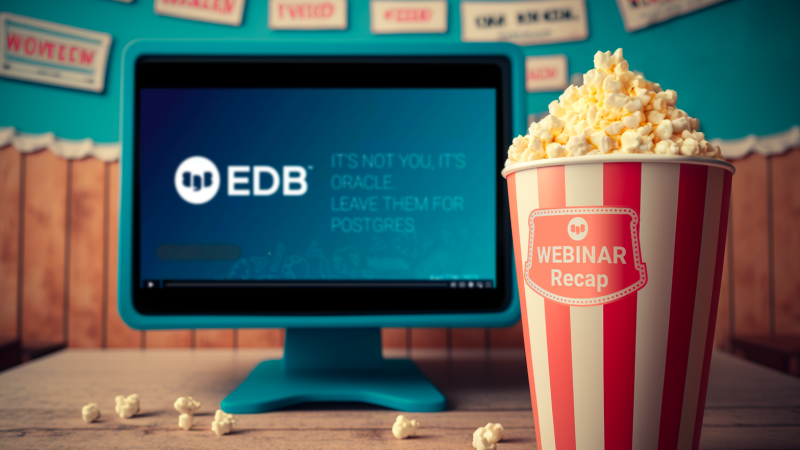Despite its reputation as one of the top commercial databases on the market, Enterprises are migrating off of Oracle in favor of open source. In fact, open source licenses now outpace legacy proprietary database licenses, and understandably so.
Rising costs and a frustrating lack of flexibility make it increasingly difficult for businesses using Oracle to innovate in the ways that they want. Lacking true control of their most valuable data and assets and restrictions on how they can integrate tools and additional infrastructures, these enterprises are turning to Postgres databases that will fully empower them to modernize their stack.
An Oracle migration project can be daunting without the right resources, support or expertise, but that shouldn’t force organizations to settle for a database that doesn’t suit their needs. That’s why, on May 18, EDB hosted a webinar entitled “Oracle Migration Made Easy.” Over the course of an hour, EDB Senior Project Manager offered a deep dive into:
- The reasons businesses are bidding Oracle goodbye
- The reasons businesses are choosing Postgres as their destination
- The most common hurdles of an Oracle-to-Postgres migration
- How to avoid those hurdles
We encourage you to watch the full presentation, and we’re excited to share the key highlights from it here!
Why leave Oracle?
As we look at the mass of enterprises who have decided to leave Oracle behind, we see some consistent drivers.
Most commonly, businesses migrating away from Oracle will cite the expenses that come with the provider’s database. However, it’s not just a question of cost alone—but of value, too.
For any organization looking to implement large digital transformation initiatives, it’s vital to ensure that all the resources you’re invested in are supporting you in the ways you need. You can’t be sinking money into a database that’s actively holding you back, especially when that money could be better used elsewhere.
Not only do companies using Oracle find themselves spending exorbitant amounts on database infrastructure and seeing continuous price hikes, but they’re simultaneously limited in their agility and flexibility.
This is a major problem for any business looking to modernize. Commercial databases like Oracle have a monetary incentive to ensure you rely primarily on the offerings they provide. As such, Oracle-dependent enterprises find it harder to seize on the potential of hybrid cloud and multi-cloud deployments, which are empowering their competition as they’re forced to sit by.
These limitations are antithetical to your growth.
Why choose open source?
When it comes to modern databases, it doesn’t get more modern than open source. In fact, 80% of IT leaders today expect to increase their use of enterprise open source software for emerging technologies.
Because open source database management systems (DBMS) aren’t commercially motivated, they don’t put restrictions on the tools that your business is able to integrate, the architecture you can build or the projects upon which you can embark. This level of freedom is only buttressed and expanded by the communities which have built, and continue to maintain and evolve open source databases.
These communities are made up of developers, users, technologists and more, all of whom have dedicated themselves to the consistent improvement of their database project. With an emphasis on the free sharing of knowledge and experience, every single participant in the open source project makes the database stronger. There’s no desire to restrict, stymie or hinder your organization’s success or innovation—because your success and innovation propels the success and innovation of the community as a whole.
Why Postgres?
Postgres is the gold standard for these values. In fact, it boasts the distinction of being:
- The fastest growing DBMS
- The open source database project with the largest developer community
- The most loved database among developers
Everything that attracts businesses invested in digital transformation to open source is at its pinnacle in Postgres. If you’re looking to move away from limited ROI, frustrating inflexibility, and a pen around your potential, Postgres is the best possible option.
And you don’t have to take our word for it.
Planning the perfect migration
Once you’ve made the decision to move from Oracle to Postgres, the real fun begins.
A massive database migration project is a serious undertaking, and—in the case of Oracle-to-Postgres—there are key challenges to keep in mind. While Matthew Lewandowski digs deeper into the nuances of each, the ‘Big Four’ to keep in mind are:
- Migration expertise: What experience does your team have executing any sort of database migration? What pressures will your teams face?
- Oracle and Postgres expertise: Beyond the migration itself, are you familiar enough with both Oracle and Postgres to ensure that your architecture isn’t discombobulated and that the various steps you have to take to disengage with Oracle and deploy in Postgres are executed properly?
- Contract issues: Where does your contract stand with Oracle? How will that impact the migration and your resources?
- Oracle-specific applications: How many of your most important applications are designed for Oracle? How will that affect your ability to run them in Postgres?
While it is possible to achieve a top-notch Oracle-to-Postgres migration on your own, these considerations touch on so much of your essential infrastructure that the effects of an issue occurring would be wide-ranging.
Luckily, you don’t have to go it alone!
EDB is the expert in Oracle migration
For 20 years, EDB has specialized in helping enterprises of all sizes make the most of Postgres database. With a deep bench of expertise—including members of the Postgres’ project’s Core Team—we’ve moved businesses around the world into a new Postgres environment.
When it comes to Oracle migration, we know exactly how to support you and address any challenges you might face. In addition to our experience with Oracle, Postgres and a large number of diverse migration projects, EDB Postgres boasts powerful Oracle compatibility, which means your Oracle architecture and all your Oracle-specific applications can run just as they were in your EDB-managed Postgres environment. Furthermore, with 24/7 support around the world, any issues you encounter before, during or after migration will be addressed by our enterprise-class support team.
With EDB, it’s easier than ever to say goodbye to the restrictions of your old database, and say hello to the database of your future!
Discover the full power of Oracle migration
This is just the tip of the iceberg! Check out the full webinar to discover all the many insights, tips and Postgres-insider tricks we couldn’t mention here. If you’re invested in innovation, digital transformation and a database that never holds you back, we think you’ll like what you hear.




